Peter MALONE
Saturday, 18 September 2021 19:57
Citadel/ 2012
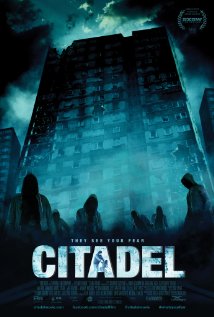
CITADEL
Ireland/UK, 2012, 86 minutes, Colour.
Aneurin Barnard, James Cosmo, Wunmu Mosaku.
Directed by Ciaran Foy.
Citadel is a small-budget films, set in Glasgow, with Irish finance. It was directed by Ciaran Foy who was to go to the United States and direct the critically and financially successful thriller, Sinister 2.
The setting of this film is a rundown housing estate in Glasgow, the title referring to the high-rise building in the centre, an ominous image, with bleak surroundings, dark interiors and flats, but with feral children in the basement, multiplying abductions, blind and aggressive.
Aneurin Barnard is the father who sees his pregnant wife attacked by the children. He gets out of hospital, the baby is born, but she dies – and he meets a strange priest, James Cosmo, at the funeral. He returns to the Citadel to protect his child, helped by a very sympathetic nurse, Wunmu Mosaku. He is warned by the priest that he and the baby are in danger. Eventually, the priest decides to rewire the Citadel, the young man confronts the children and is able to recover his abducted baby. The priest, sacrifices himself and the building explodes, the young man rescues his child.
The film was billed as a horror story and that is true of the climax, but it is really more of terror story.
1. A contemporary story? In contemporary Glasgow? The dilapidated housing estate? The feral children? Abductions? Confronting the children?
2. The Glasgow setting, the image of the high rise block, like a contemporary citadel? The grounds outside the building? The interiors, the apartments, corridors, lifts, basements? The touch of the eerie? The musical score?
3. The credibility of the plot, the parents of the children, the increasing number of children, abductions, blind and the darkness, the attacks? The explanations given about their being there?
4. Tommy, his pregnant wife, their going out, his fears, in the lift, seeing his wife, the children’s attack, his helplessness, taking her to hospital, in care, the birth of the child, his holding the child, his wife’s death?
5. The funeral, the strange priest and his comments, that the children were coming to get him?
6. His fears, going back to the flat, with the child, his care of the child? The character of the nurse, her care, for the child, her love for Tommy? Threats and her fear in going to work, in the subway? The child being taken, his being distraught?
7. The priest, his character, mechanical, gruff manner, not particularly priestly? His warnings? His being with the young boy, the young boy being blind, rescued from the feral children? Accompanying the priest, helping, his motivation?
8. The plan, the priest and his working on the wiring of the building, to set up an explosion? Tommy, searching for his child, the help of the blind child, going down into the basement – the touches of horror and terror, the children and their kind of life, finding the baby, rescuing the baby, realising that the children could not see, his passing through quietly and escaping?
9. The wire, the explosion, the collapse of the building, the priest sacrificing himself?
10. A film of urban terror?
Published in Movie Reviews
Published in
Movie Reviews
Tagged under
Saturday, 18 September 2021 19:57
Back Street/ 1932
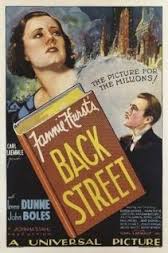
BACK STREET
US, 1932, 85 minutes, Black and white.
Irene Dunne, John Boles, June Clyde, George Meeker, Zasu Pitts, William Bakewell, Walter Catlett.
Directed by John. M Stahl.
1. The popular novel by Fanny first? The later remakes, the 1940s, the 1960s? The perennial themes, in very much that of the end of the 19th, beginning of the 20th century?
2. The production qualities, Universal Studios, black and white photography, Cincinnati at the turn of the century, New York City, Paris? The atmosphere of the city, the Cumberland the nightlife, the homes? New York, business, apartments? The musical score?
3. The title, Ray, her explanation to the upset woman in a relationship with a married man, the husband is keeping mistresses in back streets?
4. The story of a Ray, I ran Dozen and rather luminous screen presence, out of town, the disapproval of her mother, the leniency of a father, her younger sister, the presence of curved, his work in the garage, inventions, working on cars, bespectacled, respectable, the family hoping that Ray would marry him? His proposal, the sitting in the car, saying that she didn’t love it in that way?
5. Her friends of the carnival, Reckless and the salesman, travelling? At the station, the chance meeting with Water? The company, his charm, invitation, her decision to go, meeting every night, the explanation about his fiancee, his work at the bank? His wanting to avoid people see him? The possibility of his calling for his marriage? The arrangement to meet Ray at the bandstand, to meet his mother?
6. Ray, preparing to go, Frida and her being upset, dramatically suicidal, appealing to rate to help her with her boyfriend? Race stand behind? Her being late to the bandstand, everybody leave? And the irony of Frida the later marriage?
7. The five years passing, forgetting to New York, the chance meeting with Winter, Walter, the explanation of the note, her being hurt? His marriage, the children? It is wanting to meet, bringing? Her agreeing? Becoming his mistress? His visiting, seeking his wife? The love between the two, her apartment, the financial support, accepting her role? The encounter with the young woman and her being upset about love, Array and the?
8. The chance meeting with bullet, his achievement, Detroit on cars, his wanting to go out with Array? The irony of Walter turning up?
9. The years passing, the decadence with water, her living Back Street life, and accepting it? The financial support? The tensions between the two? We don’t of the casino, being seen by Walter’s children, her leaving, the son, the confrontation, we are? Warning her?
10. Walter, his important positions, cabaret and checking is speeches? Her preparing to meet him, the information about his death, his stroke, his getting his son to Ray, whispering to her, you instead? Her UN’s death? Her that he was dealing her that he would be reinvested her hearing his death.
11. the visit, the promise of support, her waiting, what to die end be with Walter?
12. The moral implications, is a different reality as shown images and story?
Published in Movie Reviews
Published in
Movie Reviews
Tagged under
Saturday, 18 September 2021 19:57
Elfie Hopkins/ Elfie Hopkins: Cannibal Hunter
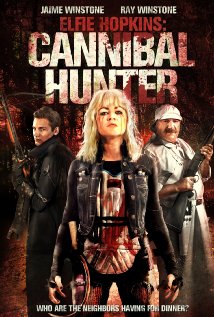
ELFIE HOPKINS/ ELFIE HOPKINS: CANNIBAL HUNTER
UK, 2012, 86 minutes, Colour.
Jaime Winstone, Aneurin Barnard, Rupert Evans, Kate Magowan, Will Payne, Kimberley Nixon, Ray Winstone.
Directed by Ryan Andrews.
Elfie Hopkins is something of a bizarre small film. It is a star vehicle for Ray Winstone’s daughter, Jaime, who serves as one of the producers – and has her father in a key role, especially for the climax of the film.
The subtitle gives the plot away.
Elfie lives in a small village, hangs out with her friend, the nerd, Dylan, Aneurin Barnard. With his glasses and black hair, he could pass for Harry Potter’s older brother! He has ambitions to go to the University, but seems stuck in the village, spending time with Elfie, doing drugs together.
They watch the seemingly charming family next door, there is some suspicions, especially with their having been missionaries and Papua New Guinea and setting up an exclusive travel agency, sending one of the families of the town on a special trip to Africa, but a revelation that they never got there, the finding of a child’s toy in the woods, and the realisation that the family were cannibals. There is another episode with a seductive young woman in the village, her encounter with the father of the family, his sending her on a trip and her death.
Elfie does some detective work, but when the deaths occur, Dylan seems implicated, and nobody believes Elfie’s stories. Which brings the plot to a rather bloody climax, and deaths all round.
Oddball and bizarre.
1. A story of detection, young adults and their lifestyle, hopes and ambitions, the encounter with neighbours, detective work, the revelation of the cannibalism?
2. The credibility of the plot, the characters – but with the touch of grim humour?
3. The British setting, the country town, homes, mansions? The butcher shop and other details? Homes and interiors? The woods? The musical score?
4. Elfie, her age, experience, the death of her mother, being brought up by her father, stepmother, the touch of resentment? Her friendship with Dylan? Their hanging out together? Taking drugs? The bond between the two? His being in love with her? Looking at the neighbours, the puzzle about the Gammons? The visit, the social, the gossip? Clashes between neighbours? The Gammons and their being in Papua New Guinea? Their travel plans? The couple going on the tour, driving away, Elfie watching? Suspicions?
5. The portrait of the Gammons, suave in manner, the touch of glamour, the two eccentric children? Arrival, Elfie and Dylan watching? Friendly, but the daughter and her room, girlish manner dress, flirtatious? The son, surly, with the arrows? The father and his charm, Elfie and her initially favourable response? The young girl, seductive, the father resisting, later meeting her, the suggestion about the trip?
6. The visit to the butcher, his good words about the family? His later turning up, the shooting, the final rescue?
7. The revelation that the family were cannibals, researching information, Papua New Guinea, cannibal traditions? The travel agency as a cover? Their finding the child’s toy in the woods, the suspicions? Seeing the family taking the body into the house? The bodies, the storage, cutting up, the meals, the head in the refrigerator?
8. The buildup to the confrontation, elderly and her stories, the police not believing? Given and his being taken, arrest?
9. The final confrontation, Elfie, the dangers, Dylan and his being freed? The role of the children, the pursuit, the arrows, their deaths? The mother? The father returning, the buildup to the drama, the butcher shooting him?
10. Dylan, his plans to go to the University, his father, stuck in the village, the detective work with Elfie, his being something of a nerd, computers, his contribution to solving the case?
11. Elfie, her character, family, manner – and her future?
Published in Movie Reviews
Published in
Movie Reviews
Tagged under
Saturday, 18 September 2021 19:57
Perfect Catch, The/ Fever Pitch
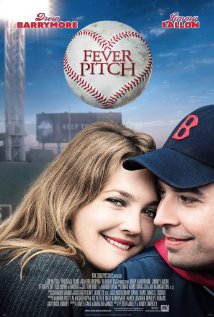
THE PERFECT CATCH
US, 2005, 104 minutes, Colour.
Drew Barrymore, Jimmy Fallon, James B.Sikking, Jo Beth Williams.
Directed by Peter and Bobby Farrelly.
If Hollywood was going to do a remake of the popular novel by Nick Hornby (About a Boy, High Fidelity), would they ask the Farelly Brothers to do it? The answer would probably be a resounding no. The Farrellys started their successful careers with such broad (very broad) comedies like Dumb and Dumber, went slightly up-market with There’s Something About Mary and Me, Myself and Irene. Admittedly, they were much more gentle in their recent comedy, about Siamese twins, Stuck on You. Although there is a sickness sequence near the beginning of Fever Pitch, you would not pick this as a Farrelly Brothers film. It must be that they, like all Americans, just love baseball.
Originally, this was a British football story with Colin Firth as the fanatic teacher-fan. Now, it has been transferred to Boston, the team is the Red Sox. The film makes much of their long (very long) running streak of defeats, the devotion of their followers as well as their resignation to losing. (And by serendipity, as the film was being shot, the Red Sox actually won the league championship). Instead of the rather uptight Firth, we have Saturday Night Live’s Jimmy Fallon (who made a strangely alienating impression in Taxi with Queen Latifa). Here he is better cast as the fan who never really grew up, whose life is baseball – whose church, as he says, is baseball. (Jimmy Fallon became a very successful late night television show.)
The point, of course, is: how can you be a lifelong fanatical supporter when there is more to life than baseball (impossible as that might sound to the fan). Here, life comes in the form of workaholic and ambitious Drew Barrymore. They both fall in love and have to find out where baseball finds its rightful place in a marriage.
For non-Americans, especially those who have observed baseball in many a film but who would not travel to a field of dreams, this film is not as involving as the makers would hope. But, with its light touch and comic aspects, it makes a cosy romantic comedy.
1. An entertaining romantic comedy? The attractiveness of the stars, credibility of their characters and performances?
2. Boston story, baseball, the Red Sox, fans and their devotion, the games and play? The contrast with the business world, offices, executives, promotions?
3. The Boston settings, apartments, business world? Restaurants, bars and clubs? Fenway Park, the grounds, the seating, the play? The musical score? Songs?
4. The adaptation of a British football story? To the US, to baseball? A still valid story?
5. The prologue, Ben, young, his parents, his uncle, taking him to the game, the explanations, his becoming a fan, the gift of the seats, growing up fan – and fanatic?
6. Ben, as a character, maths and teaching, the students, taking them to the company, the tour, meeting Lindsay, the attraction, his going back to thank her? The date? His past relationships, the girlfriends falling foul of his devotion to the Red Sox?
7. Lindsey, the bond with her parents, her hard work, the secretary, at the office, the visiting executive and his being attractive? Her ambitions, liking her work, the possibility of promotion? Her girlfriends, the gathering together, chatter, the rivalry and the touch of cattiness?
8. Accepting Ben’s bends invitation, the outings, their talking, compatible, her being attracted? His liking her, loving her?
9. The reality of his being a fan, the matches, the seats, every summer with the same people around, the comments about play, his taking Lindsay, her learning about baseball, talking with the friends, Ben and his behaviour, even excessive?
10. The crisis about the party, her parents, his going to the spring training in Florida, the behaviour of his friends, on television – and her father thinking he was a fool? The visit, his charm – and his helping the father with golf and to become a member of the club?
11. Lindsey, the agreement to go to the games, the effect on her, her knowledge? It becoming wearing, the need for worktime, the interviews? Not going to some of the games, their agreement?
12. Ben and his friends, the discussions, the system whereby they got tickets from him and games to go with him? Their advice?
13. Ben, his decision to go to the party with Lindsey, foregoing the game, not wanting to hear what was happening, going home, the perfect day, getting the food – and the phone call, the fact that the Red Sox had won, his outburst, the touch of bitterness, her being hurt?
14. The effect on Lindsey, keeping to herself, with the girls, the girlfriend becoming pregnant, the chatter, discovering that the girlfriend’s husband was going to buy Ben’s tickets? Her being called to the promotion party, coming to the realisation that Ben loved her by being prepared to sell the tickets, her leaving, going to the game, the scalper, getting through the guards, hanging from the deck, the glasses and seeing Ben’s signing, running across the field, being intercepted, her manoeuvres, tearing up the contract, the kiss and everybody applauding?
15. If Ben was prepared to give up the tickets, she would be prepared to give up her time, compromise, love, happiness?
Published in Movie Reviews
Published in
Movie Reviews
Tagged under
Saturday, 18 September 2021 19:57
Locked Door, The
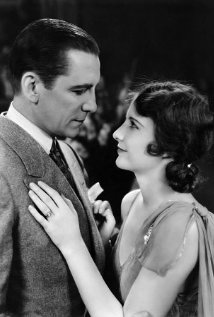
THE LOCKED DOOR
US, 1929, 74 minutes, Black and white.
Rod La Roque, Barbara Stanwyck, William Boyd, Betty Bronson.
Directed by Geo. Fitzmaurice.
The Locked Door is the first credit for Barbara Stanwyck, as early as 1929, the year year she turned 22. Also in that year she made Mexicali Rose, getting top billing. In these films, she showed that she could do the star turn, look and be glamorous, but this was not enough. She showed she could play more shady roles, women under suspicion, and, in Mexicali Rose, a vamp.
This is an early sound film directed by Geo Fitzmaurice was to make a number of dramas at MGM. Already the sound engineering was beginning to change, this film opens with a very long tracking along a crowded bar with everybody placing their orders, finally finishing with Barbara Stanwyck and Rod la Rocque. They are on a pleasure boat, with illicit drinking, with rooms assigned for romantic rendezvous, and then the boat raided before Barbara Stanwyck, playing the secretary of the businessman, is able to evade the unwelcome attentions of the host.
They are arrested, photographed, but escape bail.
18 months later, Barbara Stanwyck is married to the boss of the company, William Boyd (nickname ‘Stage’ to contrast him with the other William Boyd who was Hopalong Cassidy). He receives news that the marriage of a close friend has been disrupted by infidelity – and the man responsible is Frank, Rod La Roque. In the meantime, the businessman’s sister, Betty Bronson who was the Virgin Mary in Ben Hur, has fallen in love with him. When he comes to the house, he is confronted by Barbara Stanwyck who warns him off her sister in law.
The young woman persists and Barbara Stanwyck goes to the house to confront Frank, only to find that the businessman also comes up, warning Frank who reveals the background of his seemingly respectable wife, the two quarrelling and a gun going off with Frank wounded. He leaves the body but locks the door of the apartment, trapping his wife. Barbara Stanwyck contrives to take the blame for herself, having the phone off the hook, and acting as if she was being assaulted by Frank and shooting him. The receptionist (played by comedian Zasu Pitts) calls the police, all kinds of evidence against Barbara Stanwyck’s story produced, then her husband turns up and wants to take the blame. The sister also arise and is shocked. In a nice twist, the awkward waiter on the boat revealed that he was an couple of policemen and is able to corroborate by pristine weeks statements. Frank regains consciousness before dying and is able to explain the whole situation.
The film seems fairly creaky, but raises the moral issues at the time, pre-Motion Picture Code, but is mainly to be seen for the presence of Barbara Stanwyck.
Published in Movie Reviews
Published in
Movie Reviews
Tagged under
Saturday, 18 September 2021 19:57
Mexicali Rose/ 1929
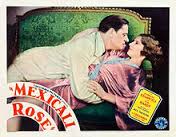
MEXICALI ROSE
US, 1929, 60 minutes, Black and white.
Barbara Stanwyck, Sam Hardy, William Janney.
Directed by Earl C. Kenton.
Mexicali Rose is the second film for which Barbara Stanwyck had a credit, and here she is the lead. Her previous film, with second billing, was Locked Door, both films of 1929.
This one is mainly for Barbara Stanwyck fans, to see her at the beginning of her career, aged 22, a young actress, almost in a dual role, the seductive and worthless vamp and the seemingly respectable young bride.
The film focuses on Barbara Stanwyck’s Rose, married to the manager of a casino, called The Gold Mine, south of the border. He is Happy, played by Sam Hardy. On his return, he is made suspicious about the behaviour of his wife who, in fact, has been carrying on with the manager of the casino. There was a showdown and Happy ousts her – but retaining his manager. In the meantime, Happy goes to Berkely to see his protégé, a football player, who is in love with a young woman named Marie.
There are some bizarrely written scenes – at least from a 21st century point of view – where Happy actually invites his protégé to come and spend his honeymoon with him at The Gold Mine, which the protégé thinks is an actual mine. The dialogue of Happy and the response of the protege, sharing a hotel room with beds visible, smacks these days of some kind of homoerotic connection, something which has continued with Happy and his being unable to relate well to women and trying to do something good for the protégé when he comes south.
But, when he arrives, Happy finds that he is married to Rose! The young man describes having met her, how he fell in love with her, and has Arose put on a pedestal. In the meantime, it emerges that she is probably try to get some revenge on Happy, coming south, protesting to be a faithful wife, yet interacting with Happy and with his manager, along with a young man with limited intelligence whom she liked in the past, Loco.
The end, after only an hour, is rather surprising. When Happy warns Rose off and threatens her, the news comes that she has been found dead, drowned!
This was in 1929. Barbara Stanwyck was to continue in films and television, from the early sound era to the video cassette era, with The Colbys in 1986.
Published in Movie Reviews
Published in
Movie Reviews
Tagged under
Saturday, 18 September 2021 19:57
She's Funny That Way
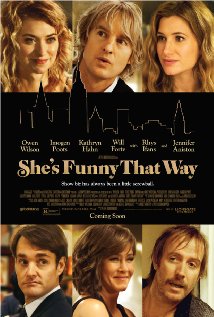
SHE’S FUNNY THAT WAY
US, 2014, 93 minutes, Colour.
Imogen Poots, Owen Wilson, Rhys Ifans, Kathryn Hahn, Will Forte, Jennifer Aniston, Illeana Douglas, Cybil Shepherd, Richard Lewis, Austin Pendleton, George Morfogen, Debi Mazar, Colleen Camp, Tatum O’ Neal, Jennifer Esposito, Lucy Punch, Joanna Lumley, Quentin Tarantino.
Directed by Peter Bogdanovich.
She’s Funny That Way is an amusing comedy geared to an older audience. It was directed by Peter Bogdanovich, now himself so much older than in his heyday of the 1970s. He had his ups and downs as a director, but his ups were mainly in the first half of the 1970s with his American classic, The Last Picture Show, then one of the funniest comedies of all time, What’s Up Doc and the nostalgic piece, Paper Moon. It is 13 years since his last film, The Cat’s Meow.
This is a comic farce, a whole lot of coincidences, people turning up at the same place at the same time unexpectedly, people turning up in the wrong place, and then more people turning up… And it has a theatre background, which enables the whole story and characters to be quite theatrical. A lot of visual tumour, verbal humour, situation humour.
The cast is particularly strong, contemporary comic stars and quite a number of cameos from favourites from Bogdanovich’s earlier films, including Austin Pendleton as an obsessed judge, Tatum O’ Neal as a waitress, Colleen Camp, and Cybill Shepherd, Bogdanovich’s partner from way back when, as the rather frumpy mother of the central character. And there is another cameo at the end of the film – but it would be spoilsportish to anticipate the pleasant surprise of discovering who it is…
The she of the title is a New York escort, Izzy, looking attractive and glamorous, telling her life story to Judy, Illeana Douglas, who is taking notes and trying to understand what has happened to Izzy. The rest of the film is made up of flashbacks, but returning all the time to Izzy and her interview.
Izzy is played by English Imogen Poots, immersing herself in the atmosphere of Brooklyn and New York City, carrying off an ambiguous role with some charm and aplomb.
She remembers going to a hotel room of a man calling himself Derek (Owen Wilson) who is charming and finally offers her $30,000 to make a new life. She lives at home, with her parents, Cybill Shepherd and Richard Lewis, who are not enthusiastic about her acting career. But she goes to the audition, only to find that the director is Derek, whose real name is Arnold, who finds it really awkward that she has turned up for the role – and she auditions, perfectly and quite movingly, with Arnold’s wife, Delta (Kathryn Hahn). Also present is the leading man, Seth, who had spied on Arnold the night before and seen Izzy.
And also present is the playwright, Joshua, played by Will Forte. The audience has already seen him walking a New York Street with his peremptory girlfriend and her dog, dismissed by her as she goes to her office, vacated by her alcoholic mother (another humorous cameo appearance by a British actress at the end of the film, a blink and you might miss it). Jane, the younger psychologist, is played by Jennifer Aniston in one of her best, blunt and dominating and domineering, performances.
So, there are all the ingredients for all kinds of mixups, especially since Seth and Delta have appeared on the London stage and formed something of a bond. And, before you know it, several other women are approaching Arnold to thank him profusely (and loudly) for their $30,000 and how it enabled them to make a new life.
The main scene in the first part of the film, apart from the audition, is set in an Italian restaurant with the playwright taking Izzy for a meal, so impressed is he by her audition. And then, the rest of the cast all turn up, including Jane taking the obsessed judge out and, at another table, the private detective that the judge has hired to follow Izzy! Needless to say, a fine mess.
The other fine mess occurs towards the end, in the hotel where Arnold and Seth are staying, Delta turning up for a rendezvous, Arnold summoning Izzy for a discussion, another escort who doesn’t speak English well (Lucy Punch) causing revelations as she is discovered hiding in the bath, only to find that she went to the wrong room! Confusion and attacks all round.
And then we finally go back to Izzy and her interview with Judy, and her explanation of what happened to everyone.
Very light, but quite entertaining.
1. A comedy for adult audiences? Farce? New York story?
2. Peter Bogdanovich and his career, his classics in the 1970s? His incorporating past actors in cameos in this film? A film of an older man?
3. The title? Which she? The focus on Izzy?
4. Humour, visual, verbal, characters, situations, coincidences and drama?
5. New York City, hotels, apartments, theatre, rehearsal rooms, restaurants? The musical score and songs?
6. Izzy, her story, the framework narration to Judy, Judy’s interview, history, psychology, morals? Her appearance, charm, her experiences, confiding in Judy, her talk and her accent – local?
7. The flashbacks, to Arnold/Derek, his arrival, tired, the encounter with Seth, phone call to Delta, the range of phone calls, Delta, agents, arranging the escort, the setup? Seth and his watching? Izzy arriving, their going out, Indian food and dinner, the night together, the talk, his affirmation of her, offering her $30,000, the story of squirrels to the nuts? Izzy and her hopes to be an actress?
8. Arnold, his deceptions, the airport, Delta and the kids, the range of women coming up to him, thanking him for his gift of the money, their stories and making a success of their lives, this being repeated – fashion designers, the woman in the shop, even Vicky?
9. The theme of squirrels and the nuts, the quotation from Cluny Brown – and the finale with the scenes from the film?
10. The theatre background, people arriving for the auditions, the producer’s daughters, Arnold and Delta, the manager, Joshua as the playwright? Izzy’s arrival, Arnold shock, the farce, Izzy and the performance with Delta, perfect? The awkwardness of the situation?
11. Jane’s story, in the street, with the dog, bossing Joshua about? Her mother the psychologists, drinking and going away? Jane and her practice, her relationship with Joshua, sending him off, criticisms of his father on the phone calls? The arrival of the judge, the interview, the discussions about confidentiality? Izzy, the discussions? Urging her to improve her life or name, self-respect?
12. The restaurant, Joshua and Izzy? Arnold arriving with Delta? Seth and the escort? And his previous spying, letting Arnold knows that he knew? Jane and the judge? Joshua’s father and his private detection work? Working with the judge? Jane and her being upset, slapping Joshua? The farcical aspects and coincidences? Joshua and Izzy leaving, going to her home, having the meal?
13. Izzy, her parents, their rough style, attitude towards their daughter’s work, Joshua’s visit?
14. The relationship between Seth and Delta, their friendship from London and appearing, their ease together, Seth’s flirting, Delta’s response?
15. The story of the judge, his wife, his using the escort, calling Izzy Glostick, having to make decisions, needing help, his becoming more and more obsessive, hiring the detective to follow Izzy, the tangle of everyone meeting? The irony that the detective was Joshua’s father?
16. Delta, going shopping, with Arnold, the assistant and her thinking, the squirrels story? Delta and her reaction?
17. The play, Joshua and his attitude, Izzy and her hopes? The opening, the performance, success, her parents happy, Arnold waiting outside?
18. Seth, the rendezvous with Delta, her arrival, the arrival of the foreign escort, not comprehending, the phone calls, hiding in the bath, discovered, Delta’s reaction – and the escort explaining she had gone to the wrong room?
19. Arnold, Izzy, in the apartment, Delta’s arrival, showdown?
20. Later, Izzy and her telling the story? The ending for everyone? Arnold, relationships? Delta and a new husband? Seth and his being with Jane? Jane and her practice? The judge? And the irony of Izzy and her date – Quentin Tarantino!
Published in Movie Reviews
Published in
Movie Reviews
Tagged under
Saturday, 18 September 2021 19:57
Life/ 2015
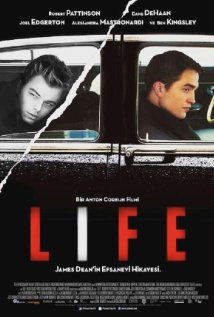
LIFE
US, 2015, 111 minutes, Colour.
Robert Pattinson, Dane De Hahn, Ben Kingsley, Joel Edgerton.
Directed by Anton Corbijn.
September 30, 2015 is the 50th anniversary of the death of emerging actor, James Dean, in a road accident. This film moves into his early career and serves as an effective memorial for his life and death.
The Life of the title is a reference to Life Magazine which devoted a story published in February 1955 to Dean. It also refers to the short life of Dean himself.
This is actually a photography story. While the object of the photography is Dean, this is the story of Dennis Stock, the freelance photographer who discovered his fascination with Dean would be shared by the public and who worked on Dean to agree to a photostory for Life Magazine.
It should be mentioned that the director, Anton Corbijn, has been a photographer for many decades, still photos, documentaries, music videos as well as several films including Control (the story of Ian Curtis and Joy Division), a story of an ageing agent played by George Clooney, The American, and a version of a John Le Carre novel with Philip Seyemour Hoffman, A Most Wanted Man, all very interesting in their way. Corbijn knows what he is doing and has quite an intense empathy with his portrayal of Dennis Stock.
For movie buffs, the film also offers an interesting glimpse into Hollywood at the beginning of 1955, with the film narrative taking place over a few months, from the promotion of James Dean’s first starring role, East of Eden, to his audition for his next role, Rebel Without a Cause, and Dean’s having to make a decision about his ambitions and what was necessary to fulfil them and the issue of studio control, not just of his career but also of his personal life, especially for the promotion of his movies.
Again, film buffs will appreciate the sequences with Warner Brothers mogul, Jack L. Warner, and his ruthlessness, which he had been exercising for decades, and his egotistic decision-making over every aspect of his films and of his stars’ careers. Although he appears in only three sequences, Ben Kingsley’s cameo as Jack L. Warner is one of his best performances.
For the modern generation, there will be a lot of identification with Dennis Stock, his back story of being in the Navy at 16, with a pregnant wife at 17, leaving his wife and child, wanting to pursue a photography career, going to galas and premieres, taking on-set photos, being published in magazines, but always looking for the breakthrough story. He is played by Robert Pattinson (who has been getting more and more significant dramatic roles since his Twilight years).
The narrative of the film is quite angst-ridden because persuading James Dean to agree to the photo-shoot is a prolonged, quite prolonged, process and Stock, making every effort, phone calls, visits, conversations, following Dean to New York City, notes under the door, living with frustration, is a thread of this drama.
And James Dean himself? He has been the subject of several telemovies and documentaries and audiences who know his films will be expecting not just an impersonation but a dramatisation of his character. Audiences may not be familiar with the actor Dane De Haan, who has been very effective in quite different roles in such films as Lawless (a slow-witted, crippled young man involved in bootlegging), the young hero in Chronicle, playing a wilful, hedonistic character in Kill Your Darlings, and the Green Goblin in The Amazing Spiderman 2).
He makes James Dean an interesting character, seemingly nonchalant, casual in the face of Hollywood, cheeky during press conferences, in a relationship with actress Pier Angeli, hoping for better roles, the touch of the rebel especially against the control by studio heads and agents, with his mumbling communication and moodiness. It is something of a shock to find that at this stage of his life, he has just turned 24, his character still being moulded and a life before him.
While Stock tries to influence Dean, Dean invites him to go to Indiana to meet his family, with a powerful scene on a train as, quietly, Dean tells the story of his family, the death of his mother, her funeral, revealing something of the personal intensity behind the facade. It is something of the same in the scenes in Indiana, on the farm, Dean reading stories with his nephew, agreeing to attend the local school dance and making a hesitant speech (saying he did better with scripts).
A good word for Joel Edgerton as Stock's agent, John Morris.
Most audiences may know that East of Eden was a success, as was Rebel Without a Cause and, Deans last film was Giant. But, six months later, Dean was dead at 24, the life that was before him gone.
The final credits are worth watching because the actual Stock photos are shown – and we realise how carefully the director had established this context for each of the photos and how skilfully he had set up the action of his film exactly like the photos.
This is a fine contribution to American cinema history.
1. A film about James Dean, actor, star, icon, a promising young man who died early? Released at the time of the 50th anniversary of his death?
2. The California story, Hollywood, Warner Brothers, agents, media moguls, the press? The contrast with New York, media, Actors Studio, snow clad city? And the contrast with Indiana, home, the farm, the town, the dance, homely? The musical score?
3. Photography story, Dennis Stock and his life, James Dean and the classic photos, the situations, Stock’s search for the actors “soul”? The director as a photographer himself? The real photos during the final credits? The film showing the contexts for each of the photos? Dramatising them?
4. The title, Life Magazine and the photos? An ambition for Dennis Stock? James Dean’s short life?
5. Audience knowledge of James Dean, his three films, the films made about him, documentaries?
6. The movie background, audience interest in Hollywood of the 1950s, Warner Brothers and Jack Warner and his control? Agents and their job, kowtowing to the moguls? The press, the photographers, premieres, press conferences? Raymond Massey and his press conference about East of Eden? Julie Harris? James Dean and his responses – and his being waylaid about the engagement of Pier Angeli? His hesitation, his shock, his well-worded response? Dean and his comments on The Boy from Oklahoma, the repercussions, Jack Warner with the tape, his threats to James Dean? Destroying the tape? Gossip, relationships, Dean with Pier Angeli? Photographs, magazines, promotion?
7. Dennis Stock and his story, leaving school, in the Navy at 16, married at 17, his wife’s pregnancy, the separation, his phone calls to his wife, financial support, visiting New York, her anger against him, his distance from his son, taking him out, in the park, showing him how to work the camera? Leaving his family, his talking about his son to James Dean?
8. Dennis Stock’s career, photos for Life Magazine, photos on sets, the prospect of going to Japan for Teahouse of the August Moon? The portrait of his boss, John Morris, the phone calls, the discussions, Stock and his persuading his boss about James Dean, the photos, his boss urging him to do better, to find the actor’s soul? Ultimate success? Dean as an unknown?
9. Stocks first encounter with Dean, in the bar, the quiet actor, the conversation, reluctantly going to meet the press, the audition with Nicholas Ray and his preparation of Rebel without a Cause, with Natalie Wood? Dennis going to see East of Eden, impressed? His idea for the photo-story?
10. The angst in Dennis trying to persuade Dean to follow through, for such a long time, the phone calls, the visits, going to New York, at his door, the note, being reluctant, following him in the street, going to the Actors’ Studio, the meeting in Times Square in the cold, the party and the drugs? Dean inviting him to go to Indiana with his family?
11. Dean, the audience gradually learning his background, initial impressions, just turned 24, mumbling, the touch of the rebel, resisting pressures, the studio exerting them, his ambitions, work on stage, East of Eden, the success, his nonchalant attitude and behaviour, the press conference, his faux pas with The Boy from Oklahoma? Listening to Dennis or not? The relationship with Pier Angeli, love, leaving her behind, the shock of hearing about the engagement? Jack Warner, laying down the rules, the role of the studio bosses? In New York, contact with his agent, ignoring him, Warner upset at the preview, letting him have a long leash? The Actors’ Studio, the friends, drink afterwards, the drugs? The pressure, the news that he got the part in Rebel Without a Cause?
12. The dramatic effect of the scene in the dining car on the train, Dean’s long story about his family, the death of his mother, the court – and audiences understanding and appreciating something of him as a person?
13. Indiana, on the train, the uncle meeting the train, family, folksy, the meals, grace before meals, the farm, horses, the bull, the tractor? Dennis adapting, from the city, taking the photos? Dean with the young boy, the reading and the voices?
14. Denis, overhearing Dean’s comments, getting in the way from himself, invitation to stay, the range of photos?
15. Going back to New York, Stock’s career for another 50 years? Dean and his death?
16. A pleasing portrait, not seamy, not a behind-the-scenes portrait – but what might have been? The comparison with Paul Newman – and his career success?
Published in Movie Reviews
Published in
Movie Reviews
Tagged under
Saturday, 18 September 2021 19:57
Stalkher
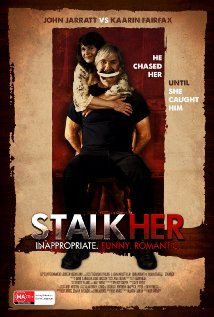
STALKHER
Australia, 2015, 90 minutes, Colour.
John Jarrett, Kaarin Fairfax, Robert Colby.
Directed by John Jarrett and Kaarin Fairfax.
The play on words in the title seems obvious but it is surprising that this has not been used so much more in the past. It sums up of the action of this film – but not quite because there is a twist that might become more and more apparent as the action goes on.
This is a joint project by the two actors, John Jarrett and Kaarin Fairfax, with the screenplay, performances and co-directing.
There are some scenes in a hospital and, towards the end, in a supermarket, but this is basically a two-hander, the action taking place within the confines of a suburban house. Two-handers are always a challenge for the audience, accepting that the action and dialogue would be confined to the two characters, requiring concentration, offering little relief. Attention requires strong and dramatic dialogue as well as powerful performances.
This time the performances are forceful in their way. We have seen John Jarrett do this kind of tough and rough and many audiences will remember his performances In the Wolf Creek films. Kaarin Fairfax has the more nuanced role. One of the difficulties for concentration is that the dialogue is expletive-filled, tiresome at the best of times, but too easy a copout for more dramatic and intense writing.
It is established that Kaarin Fairfax is a nurse in a hospital and John Jarrett’s character is a pharmacist. There are some flashbacks reinforcing this. But, of course, the question is are the characters what they seem. When a masked man intrudes into a house seemingly to terrorise the occupant, and the occupant overcomes the intruder, we have a set up for cross-interrogation, explorations of character – and further revelations.
In some ways, the toing and froing (both realistic and, sometimes, in the imaginations of the characters) has some fascination – but the danger is that becomes repetitious, and repetitious.
There is a twist but, with insinuations, invective and physical violence, many audiences will see is coming before the revelation. This twist has been used in other stories, most particularly and more effectively in the film version of Neil LaBute’s?, Some Velvet Morning.
Which means that the film does have some interesting aspects but, as for both the central characters, it is something of an ordeal.
1. The impact of the film? As drama? As psychodrama? As role play?
2. The interiors, hospital, the house, the variety of rooms? The supermarket?
3. The title, with reference to Jack and to Emily? The interplay between the two?
4. The two-hander, the strength of the dialogue, the reliance on expletives rather than dramatic writing?
5. The situation, Emily at the hospital, the intruder, masked, getting to the house, car, Emily taking control, control moving back and forth, violence, sexual interaction?
6. The film and its comment on behaviour? Male, female? Sexual language, violent language?
7. Changes in power, the different perspectives of the flashbacks, Emily’s behaviour at the hospital, with the doctors, possible liaisons, and the variety of ways of seeing Jack’s behaviour, and in the imagination of the two protagonists?
8. The scenes, realistic?
9. The reversal of roles? Audiences realising that this was role play? What Emily wanted and needed? What Jack wanted and needed? The relationship
between the two? The significance of game-playing?
Published in Movie Reviews
Published in
Movie Reviews
Tagged under
Saturday, 18 September 2021 19:57
Best of Enemies, The/ 2015
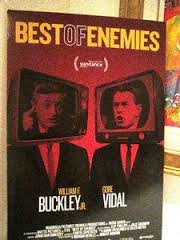
THE BEST OF ENEMIES
US, 2015, 87 minutes, Colour.
Directed by Robert Gordon and Morgan Neville.
The Best of Enemies are Conservative William Buckley Jr and Liberal Gore Vidal. With the focus on these two, and their television debates at the time of the 1968 Republican and Democratic conventions, the film is an entertaining presentation of quite different points of view, personal animosities, debating techniques and invective.
The film, however, is of interest in reminding audiences how much television news footage as well as commentary have changed in the almost half-century since the conventions of 1968. While CBS and NBC were the leaders in television news at the period, with ABC third, the ABC management had the bright idea of inviting two quite bitter antagonists to make comment each night on the ideas behind each of the parties at their conventions. And high ratings were achieved.
William F. Buckley Jr was a Conservative celebrity at the time, editing the National Review, a very conservative magazine of ideas and politics, appearing on the media, a good-looking and pleasant personality who felt self-confidently at home before the cameras. He is vehemently opposed towards everything that Gore Vidal stood for. Gore Vidal came from a rather patrician East Coast American family, his grandfather in Congress, from a wealthy background, his being educated at a boarding school, naval service during World War II, writing bestselling and provocative novels, moving into the media, writing screenplays, continuing to write novels, standing for Congress in 1960 but losing, not afraid of stating his opinions on the state of America, American culture, politics and politicians, issues of sexuality, especially homosexuality.
While the film does focus on the debates and shows excerpts from all of them, it also fills in the background of Buckley and Vidal, with Buckley the less obviously flamboyant character, flamboyant nonetheless, but capitalising on the reputation of Vidal and his controversies, especially with Myra Breckenridge (and included are scenes from the film with Raquel Welch) and his political play and screenplay, The Best Man, and scenes from Ben Hur for whose screenplay he had made contributions. The film also highlights the range of novels that he wrote, covering the period from the 18th to the 20th century situations in the US, a chronicler of the United States.
The film also fills in some of the political background, the 1964 convention with Barry Goldwater, Buckley and his being at home with Richard Nixon and Ronald Reagan, the two rivals in 1968. It shows Vidal’s connection with the Kennedys, relationship by marriage to Jacqueline Kennedy, and his growing antagonism towards Robert Kennedy.
There are quite a number of talking heads, all of them interesting, commenting on the background of the politics, of each of the characters, and of the changing ways of television with this introduction of debate, commentary, which has since become a staple of television programming.
On the Buckley side there is his biographer as well as some astute and pleasant comments from his older brother, as well are some scenes from Buckley himself in the 1980s with president Reagan, in the 1990s on his television interview programmes and his final interview with Koppell and his refusing to answer questions about he how he felt during his dramatic moment in the debates. On the Vidal side, there is a friend and biographer, a study of linguistics and a commentator from the left. And, from the political point of view, one of the significant talking heads is the Conservative Christopher Hitchens. There are also many executives from ABC television.
For those who enjoy wars of words, insinuations and invective, the film is very entertaining, each of the contestants having a way with words and expression. However, the film highlights the key moment when the Vidal called Buckley a crypto-Nazi and Buckley lost his temper, threatening to punch Vidal, and referring to him as queer. While Vidal took it in his calm stride at the time, each wrote lengthy articles about the situation for Esqire magazine. Buckley then sued the Vidal, with Vidal countersuing, a case which spent three years in the courts until suddenly Buckley withdrew, stranding Vidal.
For many of the quotations from Buckley and Vidal, the film has Kelsey Grammer voicing Buckley and John Lithgow voicing Vidal.
The film, in its comparatively brief running time, has a great deal to offer, especially on American politics, culture and media. For those interested in Vidal and his life and career, there is a documentary The United States of Amnesia which is an extensive study of and portrait of the Vidal.
This film shows the value of revisiting these controversies of the past, interpreting them within the context of the time, highlighting how politics in the media have changed over the decades.
Published in Movie Reviews
Published in
Movie Reviews
Tagged under